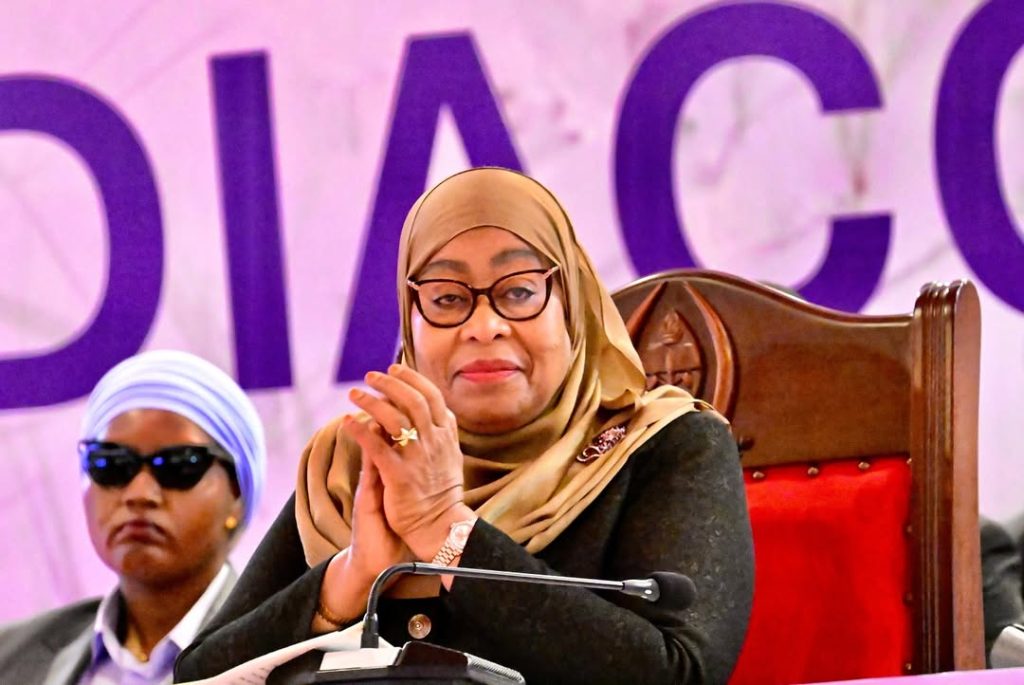During the KKKT fundraising event, President Samia Suluhu Hassan commended KKKT for advancing the interests of the weakest members of the society and lambasted those who were pontificating a gospel of Satan. She dismissed those Satanic sects with a wave of hand. She asserted KKKT avuncular works advanced the works of God.
Clearly, her mind was still engrossed in her public spat with Bishop Gwajima. Those remarks aimed at Gwajima’s posturing on Human rights advocacy.
Hereby is a detailed analysis of the context of President Samia Suluhu Hassan’s reported remarks at the KKKT fundraising event.
1. The Gwajima-Government Conflict.
– Church Shutdown:
Tanzanian authorities deregistered MP Josephat Gwajima’s “Glory of Christ Church” in Dar es Salaam, citing sermons that “contravened acceptable conduct” and endangered “peace and national stability“. Police cordoned off the church and arrested protesters.
– Gwajima’s Accusations:
Gwajima had publicly documented “over 85 cases of missing persons,” including opposition figures and activists, accusing the government of enforced disappearances and human rights abuses. He warned this damaged Tanzania’s tourism reputation.
– Political Context:
Gwajima, originally endorsed by former President Magufuli, is now a vocal critic of President Samia. His church became a platform for political dissent ahead of Tanzania’s October 2025 elections.
2. Samia’s “Satan” Remarks:
Rhetorical Strategy
– At the KKKT event, Samia framed governance as divine service while insinuating that critics like Gwajima “work for Satan.” Though indirect, this:
– Moral Delegitimization:
Positions state opposition as not just political but spiritually adversarial.
–Religious Appeal:
Invokes Christian theology to rally support among Tanzania’s devout populace, framing state authority as God-ordained.
– Silencing Tactics:
Aligns with her recent crackdown on dissent, including deporting foreign activists and charging opposition leader Tundu Lissu with treason.
3. Broader Political Crackdown.
– Election Preparations:
Samia initially lifted Magufuli-era bans on rallies but has recently arrested opposition figures, restricted foreign activists, and suppressed electoral reforms. The ruling CCM party aims to eliminate challengers ahead of October elections.
– Regional Democratic Decline:
Tanzania’s repression mirrors East Africa’s trend, with Uganda and Burundi also targeting opposition. Freedom House downgraded Tanzania to “Not Free” in 2025.
4. Key Implications.
– Escalating Tensions:
Gwajima’s church closure and Samia’s rhetoric signal collapsing church-state neutrality, weaponizing faith for political control.
– International Repercussions:
Samia’s earlier U.S. partnerships focused on democracy and human rights , but current actions risk isolating Tanzania diplomatically.
– Civil Society Fear:
Religious leaders may self-censor, while activists face heightened risks of abduction or legal harassment.
Table: Gwajima vs. Government Actions.
| No. | Gwajima’s Actions | Government Response |
| 1.0 | Accused state of disappearances. | Deregistered his church. |
| 2.0 | Warned of tourism damage | Labeled sermons “anti-peace |
| 3.0 | Allied with opposition reforms. | Samia’s “Satan” insinuations |
Key Observations.
Samia’s remarks at the KKKT event reflect a strategic escalation in her conflict with Gwajima, blending spiritual rhetoric with state power to delegitimize dissent. This aligns with her broader pre-election suppression tactics, marking a stark reversal from her early reformist image. The conflation of political opposition with “Satanic” activity risks deepening polarization and undermining Tanzania’s democratic institutions.
The teachings of the Lord Christ Jesus the Amen, human rights triumph alms.
The teachings of Jesus Christ consistently prioritize human dignity and justice over ritual religious acts, including almsgiving. Here’s a biblical analysis of His position:
1. Core Principle: Justice Precedes Ritual.
– Matthew 23:23 (ESV):
*”Woe to you, scribes and Pharisees, hypocrites! For you tithe mint and dill and cumin, and have neglected the weightier matters of the law: justice and mercy and faithfulness. These you ought to have done, without neglecting the others.”
– Meaning:
Jesus rebukes religious leaders who meticulously practiced tithing (including alms) while ignoring justice. He calls justice, mercy, and faithfulness “weightier” – foundational to true faith. Almsgiving without justice is hollow.
2. Human Dignity Over Ritual Observance:
– Mark 7:9-13:
Jesus condemns using religious traditions (like “Corban” offerings) to evade responsibilities to care for parents, saying:
“You reject the commandment of God in order to establish your tradition!”.
– Implication:
Upholding human dignity (here, honoring parents) supersedes ritual giving. Using alms to mask injustice is hypocrisy.
3. Jesus’ Actions: Defending the Oppressed:
– Healing on the Sabbath (Luke 13:10-17):
Jesus prioritizes freeing a disabled woman from suffering over strict Sabbath observance, asking:
“Ought not this woman, a daughter of Abraham whom Satan bound for eighteen years, be loosed from this bond on the Sabbath day?”
– Key:
Human liberation is urgent, even if it challenges religious customs.
4. The Good Samaritan Parable** (Luke 10:25-37):
– A priest and Levite (religious figures) avoid helping a beaten man to maintain ritual purity. A Samaritan – viewed as “unclean” – saves him at personal cost.
– Jesus’ Conclusion:
“Go and do likewise.”
– Message:
Active love for the vulnerable transcends religious, ethnic, or social barriers. Compassionate action is godliness.
5. Amos 5:21-24 (Echoed by Jesus).
God declares through the prophet:
“I hate, I despise your feasts…
But let justice roll down like waters,
and righteousness like an ever-flowing stream.”
– Jesus’ ministry embodies this:
He condemns exploitation (Mark 12:40) and heals the marginalized (Mark 5:25-34).
Modern Application: Gwajima vs. Samia.
In the Tanzanian context:
– Almsgiving (like state-linked church donations) becomes empty if paired with silencing dissent (e.g., Gwajima’s human rights advocacy).
– Jesus’ Standard:
A government claiming Christian values must prioritize justice – protecting citizens from disappearances, allowing critique, and ensuring rights – above public acts of piety. Using “Satan” rhetoric to demonize critics contradicts Christ’s call to love enemies (Matthew 5:44) and seek truth (John 8:32).
Conclusion
For Jesus, human rights are divine rights. Almsgiving is virtuous only when it flows from a heart committed to justice, mercy, and defense of the oppressed (Isaiah 1:17). When forced to choose, He unequivocally sides with human dignity – as His confrontation of religious power structures and solidarity with the persecuted proves. Faith without justice is dead (James 2:17).
Read more analysis by Rutashubanyuma Nestory

